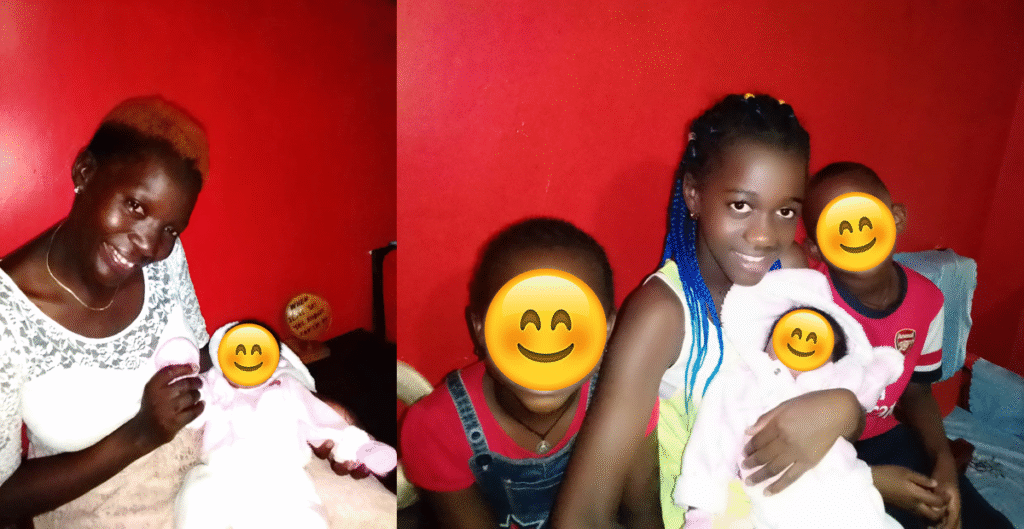Happy to be a mother

By Giovanna Pieroni
Giovanna Pieroni of AFN (Azione per Famiglie Nuove onlus) tells the story of Millycent, a support worker at a project run by the Association in Mathare, Nairobi. Having just given birth to a daughter, she overcomes the risks of both the Coronovirus epidemic and conditions in the slum.
The experience of maternity is both unique and universal. Every mother in the world loves with the same heart, the same courage, the same hope of raising and nourishing her own little one, the same embrace, the same expression as she smiles down at her baby. But motherhood for some can become even more special because of conditions which call on special reserves.
Millycent Ong’Wenyha lives in Mathare, the immense slum in Nairobi, home to half a million people. She is a support worker at the Magnificat project, which, supported by AFN, offers opportunities to children living in the slums. Millycent herself benefited from the project as a child. Her mother suffered from alcoholism and her father did not have full time work, but through the project Millycent was able to complete her education. When she graduated with her diploma, Millycent felt she could not leave Mathare but had to stay and help the children growing up there. So every morning, with other team members, she welcomes 3-5 year olds to St Anne’s Chapel, which by day becomes a nursery. With games, songs, activities and a lot of love, the children are helped to progress and put down solid foundations for their future. Millycent is convinced of the power of this work, having experienced it herself at first hand, and this faith gives her the strength every day to carry on tackling all the challenges of life in the slum, where she stays with her family. A month ago she gave birth to her fourth child, a daughter, Lorenza Nizana, just at the time when the risk from the Coronavirus epidemic was spreading.
“All of a sudden, Covid-19 became headline news in the country,” explains Millycent. “Strong government measures forced all educational activities to stop. So no children were allowed to come to school. I felt totally vulnerable. Just like them. Totally needy. Within two weeks, the situation became really serious. Parents lost their jobs, as most of them work as domestic helps or casual workers. Every day I received more and more calls for help, until in the end I fell sick. But thinking about them, I couldn’t give up, I had to be strong. Thanks to the help we received, we were able to distribute a face-mask and some food items to every family. The situation continued getting worse, but I kept on encouraging the children to be positive and not to give up on their hopes and goals. Then the lock-down was declared. It was hell. Any public transport was difficult and very costly. The price of food went up. Health care became prohibitive because of rising costs, the fear of contagion and quarantine. Mothers feared losing their children. But all in all, the situation has also had a positive impact on basic hygiene practices and on the spiritual growth of families who are trusting more in the gift of the Universe”.
According to WHO (World Health Organization) statistics, Kenya is among top priority countries for the implementation of preventative measures against Covid-19, as only 62% of the population have access to clean water and only 31% to health and sanitation services. The number of hospital beds is very limited and the ratio of health professionals is 1 to every 100,000 inhabitants. The people most at risk are precisely those families living in the slums because they live in overcrowded conditions, with little or no access to sanitation facilities.
On 12 April, Millycent was having breathing difficulties and went to hospital for tests. They did an ultrasound to check on the baby’s condition and the situation was critical. So Millycent was admitted as an emergency. Labour was induced, but as Millycent herself describes it, “I had no energy to respond at all. So at the end, there was only one chance: to have a Caesarean. I was devastated because no-one in my family has ever had a Caesarean. But I chose to be positive and concentrate only on saving the life of my baby. It was a terrible experience but I thank God for everything. At one o’clock in the morning I was blessed with the gift of my daughter. Despite all my sufferings, I decided to reject all negative thoughts. I chose to be happy, joyful and emotionally free from all I had been through. After all, it was Easter Monday, the right time to rejoice with the Risen Lord! Now I feel happy to be a mother, strong in health and very satisfied”.
According to an African proverb: “The sun should not rise twice on a woman in labor”. And infact, a long labor can be risky to both mother and child anywhere, but particularly in developing countries. Nonetheless, everywhere in the world, the courage to love and give life is even stronger. As Millycent put it, “trusting in the gift of the Universe”…
